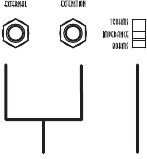
5
Bass Control7.
This controls the low frequencies in your sound—from thin and light when turned down (counter
clockwise) to warm and heavy when turned up full (clockwise) and all points in-between.
Reverb8.
This allows you to control the level of the reverb from a subtle shimmer to luscious ‘surf’ style
waves of sound. This control is very sensitive and was designed this way so any amount of
reverb can be obtained without having to push the preamp hard.
Master Volume Control9.
This controls the overall volume of your amplifi er. Use in conjunction with the volume control to
fi nd the perfect balance between pre/power amp distortion and output volume.
MV/BYPASS switch10.
This switch allows you to remove the ‘Master Volume’ control completely out of the circuit, puri-
fying the signal path for ultimate tonal clarity.
Standby Switch11.
This switch controls the amplifi ers HT supply. After turning on the Power Switch (see below),
leave the amplifi er in ‘Standby’ mode for a couple of minutes before switching to ‘ON’.
Power Switch12.
This is the ON/OFF switch for the power to the amplifi er. Please ensure the amplifi er is switched
off and unplugged before being moved.
Rear Panel
Output jacks1.
This is where you can hook up an extension or external speaker
cabinet(s) if desired.
EXTENSION SP: This speaker jack runs parallel with the internal
speakers which are wired for 16 Ohms. The extension cabinet must
be 16 Ohms.
EXTERNAL SP: This speaker jack will mute (disconnect) the internal
speakers and you can hook up either a 16 Ohm or 8 Ohm cabinet.
Be sure to set the Output Select switch accordingly.
NOTE! Hooking up a cabinet through the External jack will mute (disconnect) the internal speak-
ers!
WARNING! To ensure that your system works correctly, you must observe the following points.
Don’t use an extension cabinet whose impedance is other than 16 ohms.a)
Don’t connect a speaker whose rated input capacity is less than 35 Watts. The speaker may b)
be destroyed if you ignore this caution—not recommended!
You must use a speaker cable to connect an external speaker. Don’t use a shielded cable like c)
the one you use to connect a guitar to an amp.
You must turn off the power before connecting the cable. Connecting the cable while the d)
power is turned on may damage your amp.
NOTE! It is recommended that all audio cables, with the exception of the speaker lead, used to
connect to the TB35C1 & TB35C2 of a high quality, screened type. These should not exceed 10
metres in length. Always use a non-screened VOX approved speaker lead with the TB35C1 &
TB35C2 Amplifi er and extension cabinets.
12


















